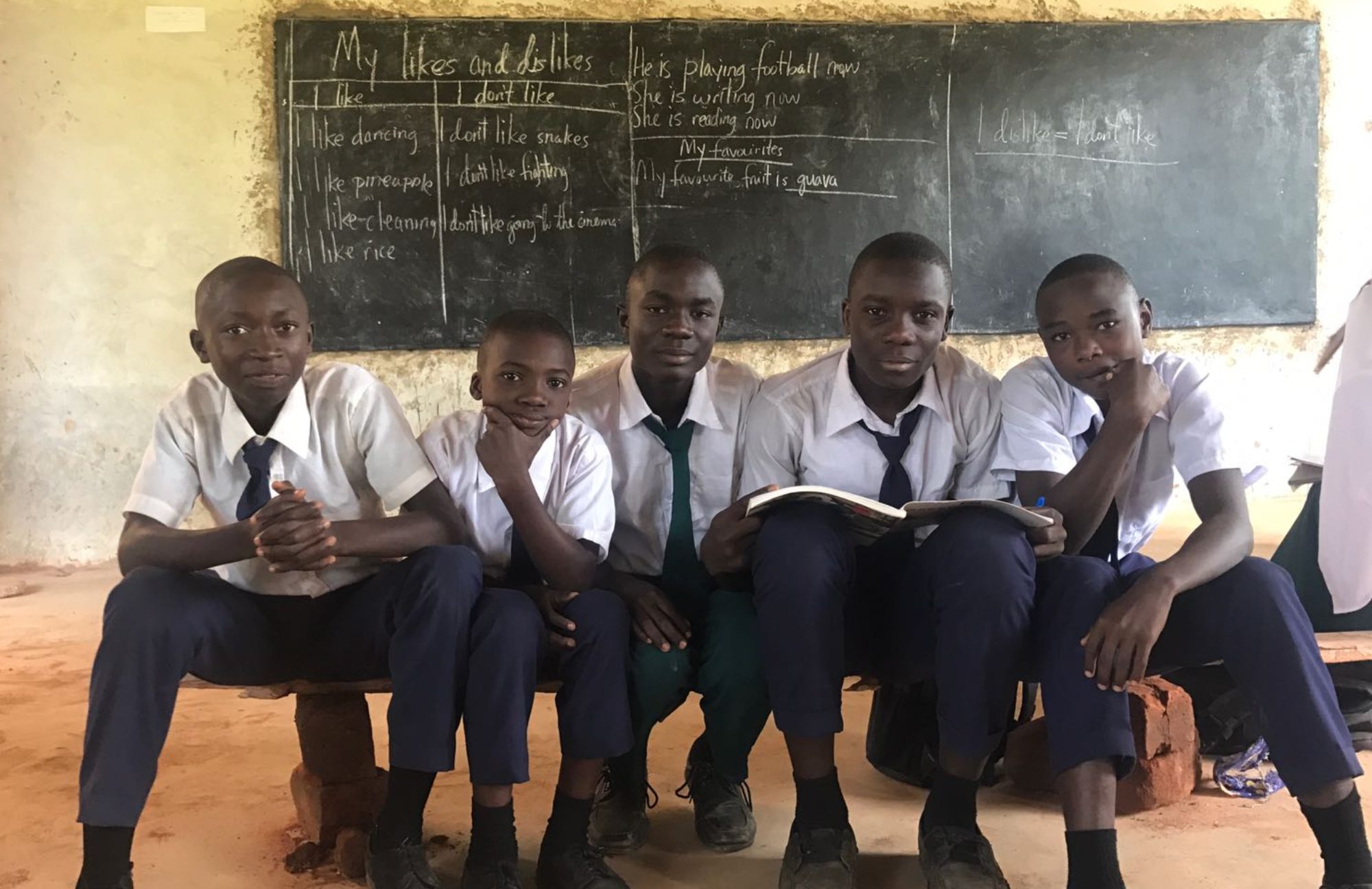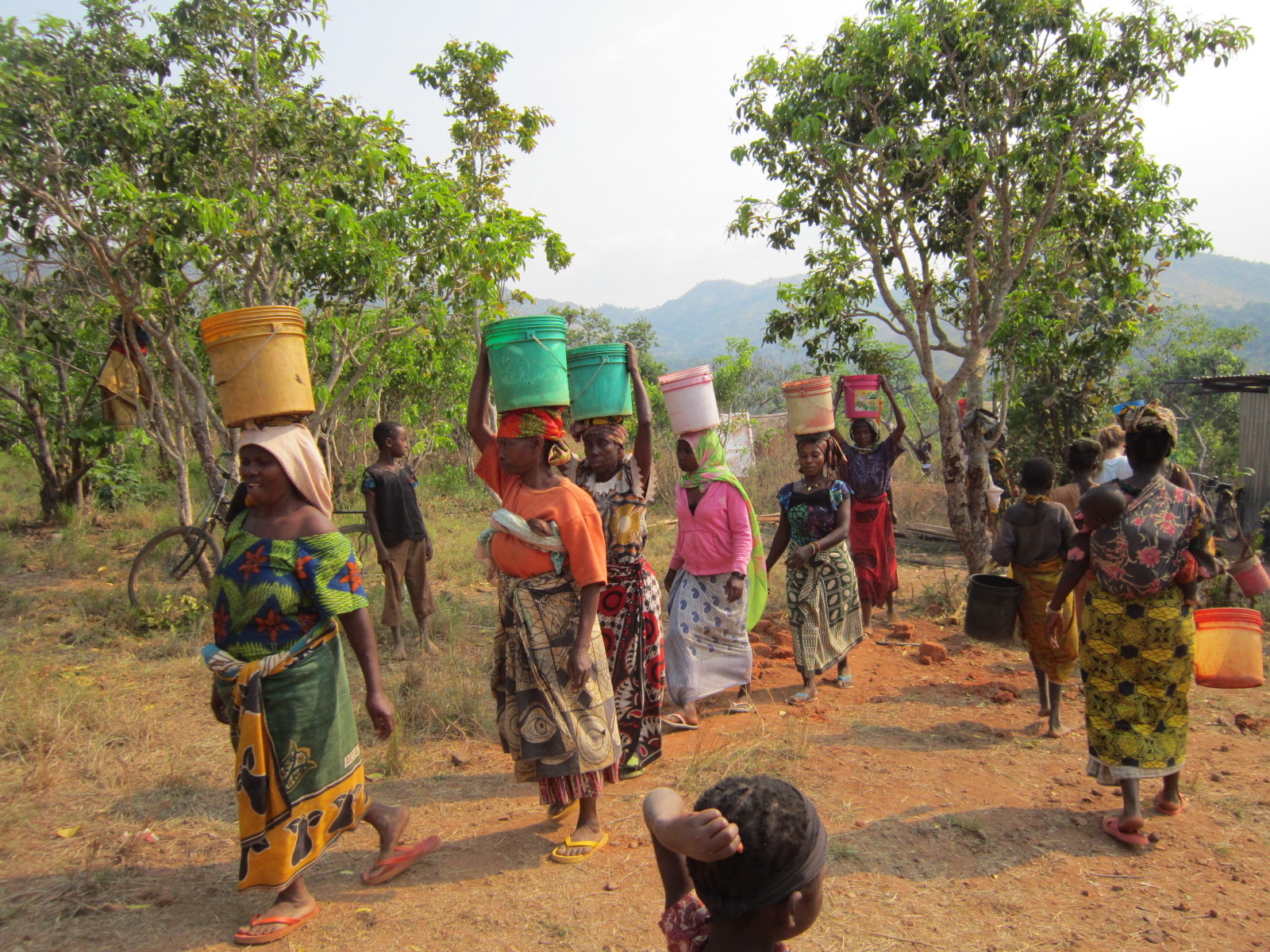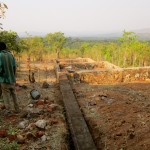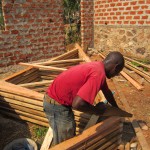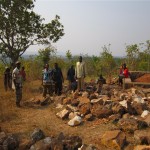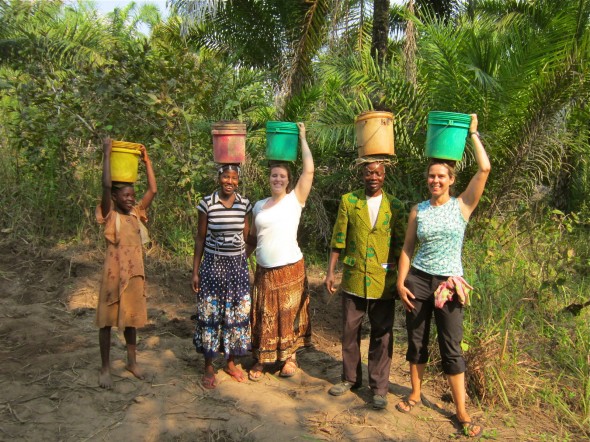This has been a remarkably productive trip! Lucas and I feel more supported by the various government entities than ever before and that’s because, after flailing around on our own for 3 years, we’ve finally stumbled upon the right people.
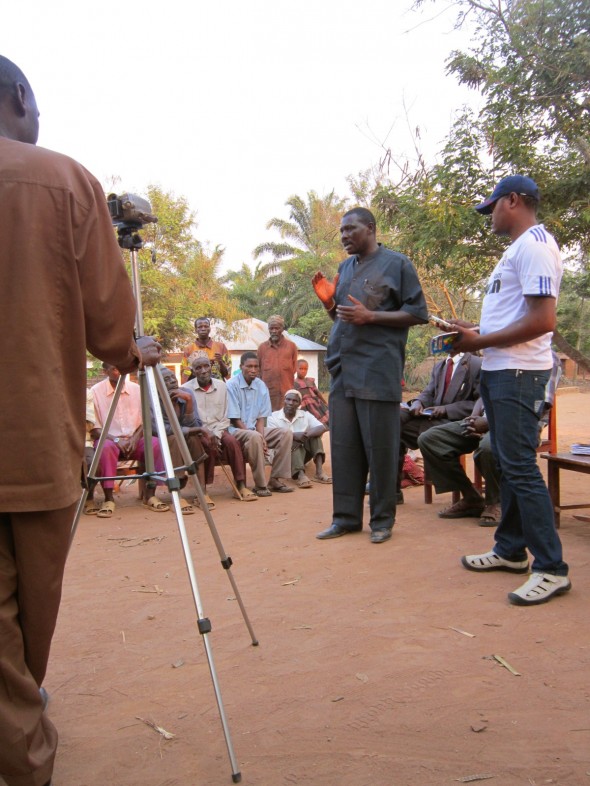 The first year we simply said ‘yes’ to the request of Mjumbe (chief) Bitata to help with a secondary school for Mgaraganza Village, to serve the children of Mgaraganza, Mtanga, Bubango, Kigalye and Kagongo. The second year, I came with donors’ money and the builders worked until the money ran out – putting up a foundation and starting the walls on our first four classrooms. That year, we also talked to the village government about finding additional local support for the project – such as that from the regional and national sources of funding for the educational sector. On their part, that momentum died in that meeting and they never sought that additional support.
The first year we simply said ‘yes’ to the request of Mjumbe (chief) Bitata to help with a secondary school for Mgaraganza Village, to serve the children of Mgaraganza, Mtanga, Bubango, Kigalye and Kagongo. The second year, I came with donors’ money and the builders worked until the money ran out – putting up a foundation and starting the walls on our first four classrooms. That year, we also talked to the village government about finding additional local support for the project – such as that from the regional and national sources of funding for the educational sector. On their part, that momentum died in that meeting and they never sought that additional support.
Back in Dar es Salaam, the capital, on my way home – I popped into the Ministry of Education for Tanzania. I was told that I could receive matching funds. I was told that a group from Norway pledged to raise a certain amount of money for a boarding secondary school and the government matched their efforts – up to $400,000! I was psyched to hear that, but was told to deal with the Ministry of Education in the Kigoma Region.
The following year, I insisted a little harder. We asked the local leaders to walk us through the usual process of building a secondary school in the village. To the best of my understanding, they said that the villagers and village leaders work together to gather bricks, water, sand and stone to start building the foundation and classrooms. After showing that they are invested and making headway, the regional leaders are advised, and subsequently check on the progress and support them as needed. In some villages, the larger support only comes after the entire school has been completed; it comes in the form of desks, chairs, teachers and teachers’ housing. Honestly, I think it varies from village to village, regional government to regional government and likely – year to year with the ‘changing of the guards’.
During this second year, Lucas and I tracked down some potential ‘powers’ to seek support or advice. We encountered a woman in an office who told us that we should be a registered NGO entity in Tanzania. She asked us to submit documentation of our NGO status. (We didn’t. We’re not a Tanzania NGO.) She also advised that we make sure the village leaders are selecting the children for our scholarship program to ensure that they are on the ‘most vulnerable children’ (MVC) list kept by the government (good information). We also met a man from the Ministry of Education for the Kigoma Region who told us that the Ministry of Education does not chip in until the school is finished. Huh?
During the third year, I was at my wits end with the lack of support from Tanzania to complete this soon-to-be government run, public secondary school. I flailed around with Lucas in one office – actually losing my cool and becoming a little emotional (i.e., shedding a tear in desperation). Then we went to the top boss – the District Commissioner, which I found out this year is kind of like the Governor. He was so gracious and took us in, no appointment, no special designation -just a couple of gumbies trying to get something done. He told us to seek support from the Ward level government to get a letter on behalf of the village government to invite the ‘right’ people to the village to see the school. He also said the local village government would have to submit a budget requesting money in order for the national government to even take this into consideration. (Complicated as it should be; I think I was naive and oversimplified it all in my head.)
You can probably guess what we did next and if not, my tales from last year might fill you in. Basically, the ward leader came with us to the village and gave the village leaders and the villagers a lashing for not contributing enough to this effort. I left that year with great hope that the budget would be submitted and the Tanzanian government would be contributing in a significant way to complete this school.
Sigh.
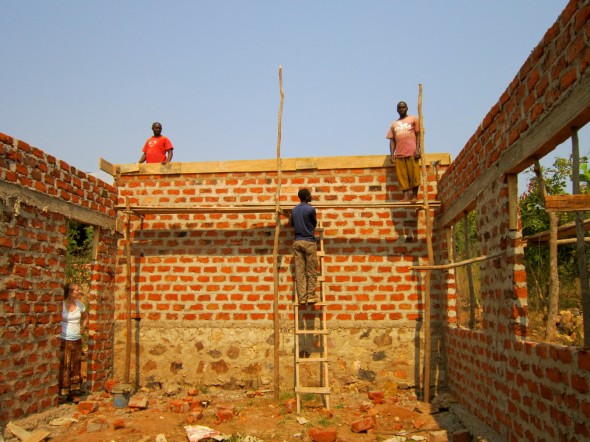 This year, I returned to see some great progress by our builders. As long as the funds flow, the work they are responsible for is completed. When the funds don’t flow, their work stops. Unfortunately, regardless of the funds, the contribution of the villagers as per our ‘memorandum of understanding’ should be continuous – but is minimal in a good week. The agreement was that they would contribute sand, stone, water and the local labor to get those materials to the building site.
This year, I returned to see some great progress by our builders. As long as the funds flow, the work they are responsible for is completed. When the funds don’t flow, their work stops. Unfortunately, regardless of the funds, the contribution of the villagers as per our ‘memorandum of understanding’ should be continuous – but is minimal in a good week. The agreement was that they would contribute sand, stone, water and the local labor to get those materials to the building site.
Upon arrival this year, I was told two bits of discouraging news.
- The leaders did not submit the budget in time last year for consideration by the regional leaders to take to the national level for approval. (Fail)
- The local leaders (one or two in particular) were not encouraging the villagers in their district to contribute the carrying of stone, sand and water; they were in fact telling them to ‘be free, relax’ – in the name of votes come election time.
Last week, Lucas, our intern Katy and I went to the village to contribute by carrying water so that Isaya and the builders could continue to work on the next foundation. They did continue to work with our meager contribution (our necks got tired!).
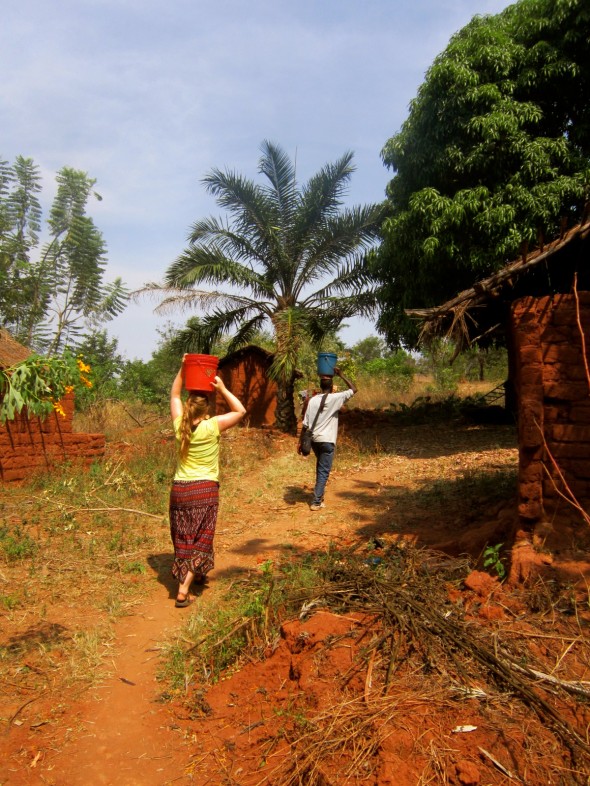 The following day … the builders returned home to Kigoma town because they couldn’t continue working without the sand and water necessary to make the cement and without the stones to build a foundation.
The following day … the builders returned home to Kigoma town because they couldn’t continue working without the sand and water necessary to make the cement and without the stones to build a foundation.
More than a little irked, Lucas and I called a meeting with the village leaders. I wrote a speech in English and my friend in town, Bennie helped me translate the speech into Kiswahili. You can view the video that shows me giving that speech in Kiswahili as well as the transcript here.
In addition to this speech, Lucas and I finally stumbled upon the ‘right’ people in town with the help of the diwani or executive chief of the village, Patrick Maganga. First, Lucas, Maganga and I visited the Development Officer for the rural areas of the Kigoma region (our villages included). His insight was invaluable, educational and hard to swallow – the latter because I wish we had known what we know now then. He taught us about the ‘chain of command’ and how to climb up it. Going straight to the top and working our way down last year was not the correct way to go about things.
Also, Lucas learned that his continued efforts to nudge the village leaders into action during the past year were useless because they were not calculated. He told Lucas that any time he plans to meet with a village leader, at any level, about the project, he must do so in the office with the secretary to have everything documented. As such, when it reaches the top – there will be a paper trail showing that he has taken the steps necessary to prompt action without success. Lucas learned a great lesson this day as much of his efforts were in passing, on the phone, through a messenger.
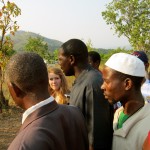 After meeting this development officer, we visited the Chairman who supports the Director of the office that oversees Education for the Kigoma Region. He was immensely impressed that we had completed as much so far and was equally disappointed at the lack of support we were receiving from the village leaders. He told Chief Maganga that he and the executive chair needed to put politics aside (i.e., wanting votes for future elections) and do their jobs, which is to promote development, encourage productivity and energize his village. He said he wouldn’t stop until he saw the village in action. He insisted on a visit to the village to have a private (firm) meeting with the leaders, a viewing of the school and another meeting to motivate (i.e., scold) the villagers into action.
After meeting this development officer, we visited the Chairman who supports the Director of the office that oversees Education for the Kigoma Region. He was immensely impressed that we had completed as much so far and was equally disappointed at the lack of support we were receiving from the village leaders. He told Chief Maganga that he and the executive chair needed to put politics aside (i.e., wanting votes for future elections) and do their jobs, which is to promote development, encourage productivity and energize his village. He said he wouldn’t stop until he saw the village in action. He insisted on a visit to the village to have a private (firm) meeting with the leaders, a viewing of the school and another meeting to motivate (i.e., scold) the villagers into action.
His talk with the village leaders at the site of Amahoro Secondary School as well as his speech to the villagers at large were compelling. He was a powerful, firm speaker but he also had them laughing and thinking.
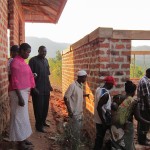 In the end, I believe there was some contention as villagers argued over which districts were contributing and which were not, but after an additional calming talk with the big boss, they were all at ease.
In the end, I believe there was some contention as villagers argued over which districts were contributing and which were not, but after an additional calming talk with the big boss, they were all at ease.
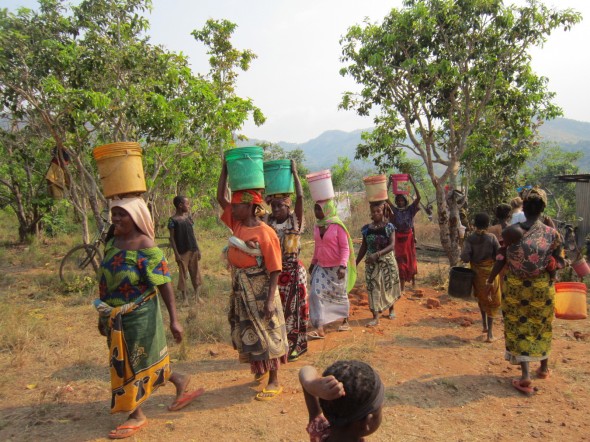 The next day, as promised, Lucas, Katy and I showed up at Amahoro Secondary School in the morning after breakfast to carry water to the well. We were surprised and happy to see at least 50 people on site – working away.
The next day, as promised, Lucas, Katy and I showed up at Amahoro Secondary School in the morning after breakfast to carry water to the well. We were surprised and happy to see at least 50 people on site – working away.
There were women carrying sand and men carrying stone. We decided to start with the water because the tank was empty the day before. We didn’t check the tank – just headed straight to the stream.
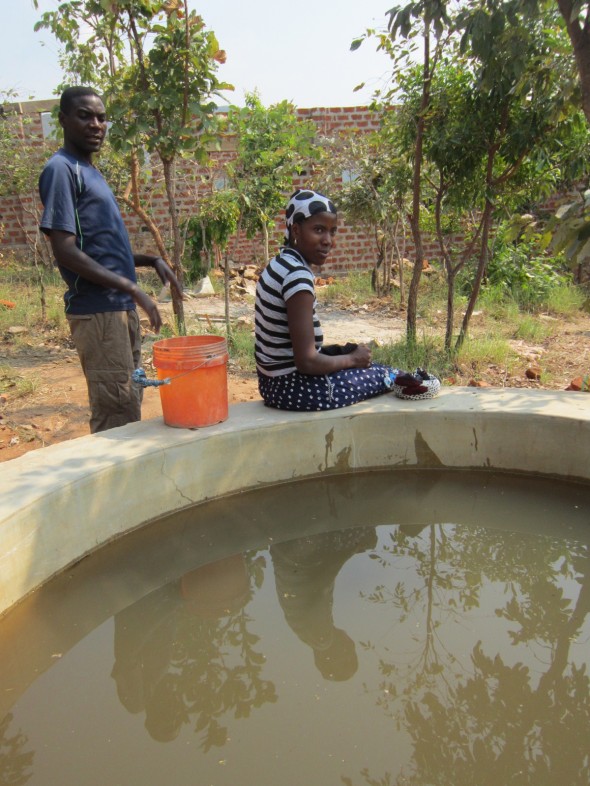 Upon arrival at the tank we were shocked to see it was full! The women had been filling it all morning and they had just started on the sand.
Upon arrival at the tank we were shocked to see it was full! The women had been filling it all morning and they had just started on the sand.
We joined them in carrying sand and as the sun took over the day, we all retired.
It was a joy to see this process unfold. It’s been an uphill battle for many reasons – not the least of which are 1) Lucas and I are rookies. Lucas isn’t trained as a project manager and I’m just a linguist 😉 ; 2) I am a great motivator in person, but can do little from the US (and shouldn’t have to once promises are made?); 3) the villagers think if the builders aren’t on site, they don’t have to do their part; and, 4) there is little accountability when the leaders don’t want to enforce agreements.
After sharing with them my thoughts about their children’s future and my role in this process, in addition to the urging of important local leaders, I do believe we’ve turned a new leaf. Either way – we’ve gotten an awful lot done in a short amount of time since the funds started flowing in early June.
The roofs are going up on the next set of classrooms. The foundation is in place for the third set of four classrooms. The villagers are in action. And most importantly …
The Kigoma leaders who came to our side in support of this endeavor have pledged to finish the floors, windows and doors on the first four classrooms in time to OPEN THE SCHOOL IN JANUARY 2013!!
We’re so excited that children, who are currently in standard 7 in the local primary school, will be able to attend Amahoro Secondary School in six short months! The builders work is secured. The regional government is chipping in significantly. New teachers and headmasters will have a job with our school. It’s a huge breakthrough and we’re over the moon! 😎
